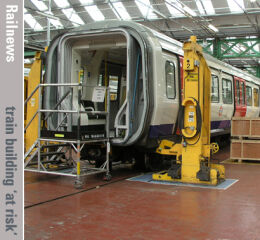Posted 21st July 2023 | 4 Comments
Industry body warns of rolling stock supply crisis

A new report is warning that train-building centres in Britain such as Alstom in Derby and Hitachi in Newton Aycliffe will run out of work within 12 months from now, putting thousands of jobs at risk.
The report from the Railway Industry Association, entitled ‘The UK rolling stock industry – making 2023 the year of opportunity not crisis,’ warns that ‘the UK will not be able to upgrade or renew trains if the factories and skilled workers are no longer there’.
The industry currently employs more than 30,000 people and is said to contribute at least £1.8 billion to the national economy. RIA is also pointing to the government’s commitment to investing in a major battery factory at Bridgwater in Somerset, saying that while it welcomes moves towards low carbon transport, similar support needs to be extended to the rail supply chain.
The lack of action over creating Great British Railways is a further problem, because the present operators are no longer franchises but government contractors, who are unlikely to make major commercial decisions like leasing new trains or modernising existing fleets.
The government has said it remains committed to GBR, but there may not be enough Parliamentary time for the necessary legislation before the next General Election.
RIA technical director David Clarke said: ‘With the last mainline order being over three years ago and no visibility of new orders for upgrading or renewing rolling stock in the UK, we are once again facing the prospect of job losses and factory closures.
‘These closures would have a deeply damaging impact, with jobs, passenger satisfaction, value for money and the drive to decarbonise all undermined by the upcoming trough in the “boom-and-bust” funding cycle.
‘This report is clear that rolling stock orders are required now. These should be “no-regrets” decisions for government as they wouldn’t require upfront taxpayer investment but would result in a broad range of benefits, from retaining jobs to immediate carbon and air quality improvement.’
RIA’s conclusions have won the backing of the Campaign for Better Transport.
The CBT’s Norman Baker said: ‘We cannot continue with the current stop-go policy of investment in rail. It breeds uncertainty and pushes up costs unnecessarily. Rail is the transport of the future: clean, green, efficient and productive. But long-term thinking by government is needed if rail's full potential is to be realised. This report should be a wake-up call for government: it must look further down the track and begin making decisions to secure the future of our railways and our rail industry.’
He continued: ‘The government has this week celebrated plans for an electric car battery factory in the UK, but there's no point creating jobs in the motoring industry while losing them in the rail industry.’
Reader Comments:
Views expressed in submitted comments are that of the author, and not necessarily shared by Railnews.

Christopher Jones-Bridger, Buckley Flintshire
Once again a lack of strategic direction is highlighted. The rail industry suppliers have been crying out for years for an update from DfT that has been forever promised but not delivered.
The forthcoming drought in rolling stock orders will starkly reveal the overcapacity in production capacity that has been allowed to be created in recent years. Fine while the good times were rolling & politicians could bask in the reflected glory as new factories were opened but unless new orders are forthcoming dark days lie ahead.
An obvious question given that the ROSCO's have been saddled with a surplus of rolling stock as relatively serviceable mainly EMU stock is displaced by the current deliveries, and especially as finance is no longer as affordable, will they be prepared to invest in further stock before the shutters come down on orderless factories? Sadly one for the DfT & ministers to resolve. Maybe with an election forthcoming they may be prompted to act. Just recall 1992 when the Networker orders led to what turned out to be a short reprieve for York Carriage Works. Interesting that while there is surely life left in South Eastern's Networkers a replacement plan may prove convenient 30 years on.
Hugo, Newbury
I went to my brothers wedding in Oxford, by train, and it was standing only at discotheque to Oxford. Probably as a result of not including electrification to Oxford. This was a horrid over site. WE also need old routes reopened to continue decarbonisation of this country. ALL new railways NEED ELECTRIFCATION. I am still appalled, by the fiasco of ticketing. Why does it cost £16 for a single to Oxford from Newbury, and then £16.10 for a return it seems ludicrous. And why is it 30¥ plus for a return to Oxford coming back the next day.??? This is not away to run the railway. MY grandad would be turning in his grave. He worked with mr stanier building steam Locos for the LMS.
Neil Palmer, Waterloo
Here's a radical idea, why doesn't Parliament put in a bit of overtime to deal with passing needed legislation, like maybe for GBR. Or is a bit of extra work too much to expect of our overpaid elected representatives?
Ron, Brighstone. Isle of Wight
With towns and cities having congestion charges, and pollution charges, and parking going up in some by 200%, Train travel is going to become essential.
Fix the strikes and get the country moving and get the train factories busy to supply the Train leasing companies. Bums on train seats is better than more in cars blocking roads. They always seem to find money for more roads for them to just fill up with more cars!